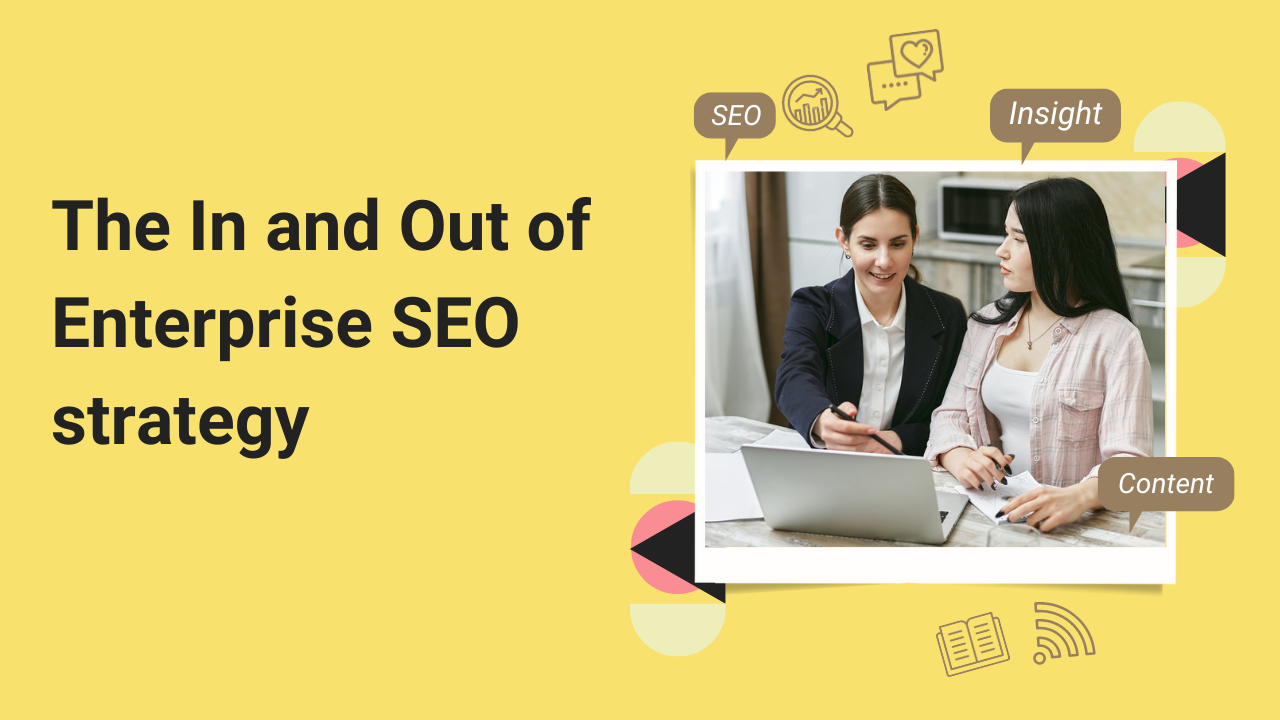
Table of Contents
First things first, let’s begin with what is an Enterprise website?
There is no general understanding of what an enterprise website is. It is basically a term for a website with a high number of pages and these pages have an impact they have on the business’s revenue in addition to its reputation, there are its key identifiers.
While one opinion is that a high volume pages website, anything above 1000 pages and high brand authority is the deciding factors for any enterprise website.
Another school of thought is the size of the organization and not its website that qualifies for an enterprise website tag.
Any enterprise site has some things in common, regardless of your school of thought:
- The website of a business has a direct impact on its bottom line and reputation.
- Keeping the site up-to-date requires considerable project management and collaboration.
- Performing tasks across billions of pages require a high level of automation.
Now that we are clear about what an enterprise website is, let’s begin with what enterprise SEO is!
What is enterprise SEO?
For enterprise-level sites with millions of pages, enterprise SEO is a strategy that improves organic search presence. In enterprise SEO, the fundamentals are not changed too much, however, there are changes in scale.
Apart from huge amounts of distinct content, all the images, products, videos, comments and other assets must be taken into account and will need much more attention than a regular website. It can be daunting to identify and diagnose technical issues or indexing or crawling problems. As compared to a smaller site that targets the same areas, the scope of work and web presence to be managed increases.
How is Enterprise SEO different from Regular SEO?
Enterprise SEO is different on various levels, especially on a practical level. Because of the large scale of business, an enterprise’s SEO demands more planning, strategy, and a lot more patience than regular SEO.
Scalability & Automation
An enterprise site multiplies the amount of work exponentially, whether it’s creating links or creating microdata.
Mergers, acquisitions, and new product launches can continue to multiply that number.
Even if everyone in your team was an SEO, it would still seem a waste to do all of that manually. Tools that facilitate scaling and automating SEO tasks are critical to enterprise SEO.
Locations in different places
A 78% share of local searches are followed by an offline purchase, which indicates local searches will continue to grow in importance.
Large enterprises that have franchises or branches that should position location-specific content in the search engine results that facilitate conversions and gives them consistency.
A content template is the best way of answering key questions for users: such as addresses, hours, and reviews.
As a result, Fitness Track Gym saw its sessions increase by 50%. It wasn’t difficult to remain competitive in the face of increased local search importance since the company is one of the largest car repair businesses in the country.
The company focused its SEO efforts on “near me” optimization and voice search. Compared with its closest competitors, visibility increased by 30%.
Several subdomains or Websites
While managing the changing, and sometimes conflicting, demands of multiple properties, enterprise SEOs also need to maintain a degree of consistency.
Reputation Management
Authority is associated with bad PR, so the greater your authority, the higher your chances of bad PR.
Branded search results can quickly become dominated by negative news and discussions.
Let’s consider this, that you are a very important person, say a CEO of a Fortune 500 company. Your name is searched more than 20,000 times a month. It isn’t accurate to state that three of the top five stories are negative.
To deliver more accurate outcomes from SERPs, you need a comprehensive SEO strategy, regardless of how good your PR team is.
By focusing on the CEO’s accomplishments and reducing unfavorable coverage, the agency remedied the problem.
In addition, he had his personal website updated, the Wikipedia page corrected, and comments on online community forums addressed.
There may also be bad press for companies with non-enterprise websites. While the impact is often not as wide-ranging as the solution.
Enterprise SEO Strategies: The Foundation of Enterprise SEO
- Optimizing the Site’s Architecture — Internal Linking: Best Practices to Lift Your SEO Game
- Conducting Focused Topic and Keyword Research — How to Use Competitor Keyword Research to Plan Better SEO Campaigns
- Competitive Research — Discover Your Competitors’ Keywords in 5 Easy Steps
- Writing SEO Content — Keyword research, Competitive research, SERP analysis, Content audits, Outlining and content planning, Content writing, On-page optimization, Internal link building, and more
- Technical SEO – 15 Common Technical SEO Issues and How to Solve Them
- Link Building – Backlink Management: Everything You Need to Know to Manage Your Links
Benefits of Enterprise SEO
- Lower the Pay-Per-Click (PPC) Cost and Effort
- Streamlined Brand Messaging
- Highly Targeted Local Marketing
- Expand to a New Audience
- Omni-Channel Impact
Best Enterprise SEO Strategies
1. Structure of the Website
In the absence of a well-constructed site, your audience isn’t going to be able to have the best experience. Your website’s SEO will suffer as a result.
You can provide a better user experience with a well-organized website structure. Your website metrics, sales, and conversions will increase as a result of making it easily accessible.
The topics and subtopics on your website should be categorized.
The first thing you need to do is create categories, subcategories, and tags.
Analyze your website’s user behavior as another strategy. View the pages on the website that are most important to you. Your users will be able to access those pages more easily if they are included in your navigation, footer, or sidebar.
2. Budget for crawling
There is no way you can ignore this strategy for enterprise SEO.
During a crawl period, crawlers set a budget for how many pages they will crawl. Your website pages will no longer be accessed once the budget has been exhausted. The crawl budget needs to be properly managed, which is why it is so important.
It’s an easy concept: the more Google crawls your website, the better your website has the potential to rank.
Taking advantage of this strategy is dependent on Google being able to find and crawl your important pages. A website’s crawl budget is wasted if it isn’t crawled. Rankings will be affected as a result.
To resolve this issue, follow these steps:
- See if there are any Google bots in your website logs.
- Google uses search operators to index your website’s content.
- No follow and no indexing are very important for pages like archives, privacy policies, tags, and other similar pages.
- Your website should be rid of older, irrelevant pages.
- Improve the performance of your website. Use as little javascript as possible.
- Interlink your website properly (internal linking).
Make sure you are careful when modifying your website to increase its crawl budget, as unforeseen changes can ruin your website’s ranking. You should consult someone who specializes in SEO when in doubt.
3. Expertise
An authoritative niche favours skilled practitioners with a deep understanding of the subject. Your website’s content about the subject matter should be high quality and credible, and the remaining factors will be easy.
Topical content strategy is predicted to have a promising future.
SEO also uses topical authority. The following are the steps to becoming a topical authority:
Creating 100 short posts similar to existing content is actually worse than writing one well-researched and insightful post.
Your own original research and experience should be incorporated into the discussion of your topic.
The importance of having a well-organized website goes beyond its benefits for navigation and search engine optimization, but also its ability to become an authority in the field.
4. Updating content
Adding new content to your website is like breathing in oxygen.
Enterprise SEO involves both creating contents and updating it. There’s no doubt that Google loves frequent updates, articles, and fresh and valuable content.
The web crawler indexes your site more frequently when you update your older content. Consequently, search engines often find your site and rank your fresh content on the first page.
Your SEO strategy should include updating old content. It’s now time to improve or repurpose your website content if you were hit by the last Google broad core algorithmic update.
Make your existing content more comprehensive to satisfy the search intent, by updating the outdated information and updating outdated details.
The rankings of your keywords will surely improve within a few weeks.
5. Branded search results and EAT
There is only one priority: to fulfill the needs of users and Google. This statement is supported by E-A-T.
The EAT process is based on “expertise, authority, and trustworthiness.”
Google’s search Quality Rater guidelines provide the basis for this concept. Online web search visitors were encouraged to be more trustworthy by reducing disinformation.
By giving your content credibility, EAT supports enterprise SEO. The search engine decides if the advice is appropriate for readers and whether expert opinions are appropriate.
There’s no direct ranking factor related to EAT. In contrast, Google uses a combination of algorithms to determine whether a website and page may be considered similar to EAT.
Your Money Your Life (YMYL) is a niche where EAT is more important than ever before. Search results related to health and money topics are provided by Google with great seriousness.
Including your company details, your team, author details, and your awards and recognitions on industry and media sites will help you to boost the traffic to your website.
EAT and your brand searches should go hand-in-hand.
Google receives a positive signal from users searching for a business by its name. As an authority, Google respects you and gives you a higher ranking.
So be sure to increase brand inquiries for your business in order to increase brand awareness.
6. Make voice-assisted searches easier
One new app will have been updated by the time you have finished reading this sentence; technology advances every second. For enterprises to stay ahead of the competition, it’s important to utilize the latest technology.
It is imperative to take advantage of voice SEO optimization. When searching on Google, many people prefer to speak their query rather than type it. Therefore, if you don’t optimize your website for voice search queries, you’ll lose your customers.
So, enterprise SEO should include voice optimization.
Here are some tips for optimizing your website for voice search:
- Think of keywords that are relevant to a conversation.
- Use lists and H tags to properly structure your content.
- A paragraph should contain only 2-3 lines.
- FAQ sections should be added.
- Implement speakable and other schema types.
7. Ensure that Enterprise SEO Audits are conducted on a regular basis
From time to time, you should perform an enterprise SEO audit. Larger sites are harder to manage. It can be impossible to figure out all issues with your site by simply looking at it.
You should perform professional SEO audits 2-3 times every year. At a minimum, one of those must be from a professional SEO expert or company. It will further reduce the chance of mistakes and help you adapt the right enterprise SEO strategies as your enterprise grows.
You must create an audit checklist that will help your team conduct the audit analysis hassle-free. You can divide your checklist into different parts such as a technical SEO audit, content audit, and link audit. This will help you to complete your audit without skipping anything.
Create a short report after all the analysis is complete for future references. Keep a track record of everything.
After auditing the website, start with small changes first. Don’t make more than one change at a time. Also, always keep a record of every change that you are making on your site with the date and time. It will help you understand what’s working or what’s not.
8. Links and Digital PR
Link building and digital PR go hand in hand in SEO strategy. Good content is of no use if there is no proper outreach source for it.
Optimizing links is a crucial part of any PR strategy. This is where high-quality backlinks help your business. In this situation, your SEO team should be helping your PR team to execute this strategy.
It often includes companies’ press releases, paid and unpaid stories, producing content that includes specific links, and more. Always try to get relevant links from high-authority sites. These kinds of links will not be easy for your competition to copy and will boost your rankings for the long term.
Digital PR works as a helping hand in building links from various influencers, media houses, and social media with the help of PR campaigns.
Finally, these websites link back to your company’s sites, allowing Digital PR to contribute to your SEO strategy.
Conclusion
General SEO and Enterprise SEO are both different but the essence remains the same for both. They both help websites perform better and increase organic growth for websites.
About the Author
My name’s Semil Shah, and I pride myself on being the last digital marketer that you’ll ever need. Having worked internationally across agile and disruptive teams from San Fransico to London, I can help you take what you are doing in digital to a whole next level.



